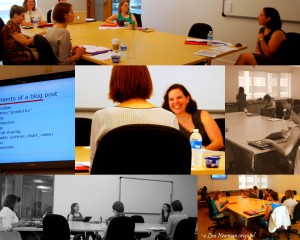How to write a contact email
If you have received any type of contact email, you know there is a way to do it and a way not to. Just this week I received a contact email that made me realize lots of salespeople don’t know how to do it. The email I got was this:
Hi Deborah:
I’m working with the [company name] sales channel, and my client requires the assistance of a company specializing in “Communications Audits”.
Kindly drop me a line to discuss (my phone number is provided below). Thanks,
[Email signature]
This email followed a voice message that went like this:
Hi Deborah, My name is X , a consultant working with the sales channel (…) and [my client] is inquiring about a communications audit. And I’d like to talk to you about it, how does it work, relative to their sales channel, it would be very lucrative to your business. …
The consultant seems to assume I understand what “the sales channel” is supposed to be. He is also looking for “communications audits” relative to the sales channel. And lastly, he is telling me it would be lucrative to my business. There are two things going on in the contact, and they are at odds with each other: looking for a solution for a client and offering something to me. Which is it? Neither is clear.
I asked for clarification as to what exactly he was looking for, and this consultant suggested having a 15-minute conversation. When I said I needed more information to see if there was a fit, he repeated what he had told me. I then wrote back saying I thought there wasn’t a fit. To top it off, I got this email back from him:
I’ll gladly give you appropriate details if we were to connect.
Surely you’re not too busy to grow your business and frankly, if you are – delegate to as a sales rep.
You’re not too important to talk to me; I deal with Presidents of companies with revenues exceeding $100M.
In the end, this person is really trying to sell ME something, which is obvious since he can’t tell me what problem his client is having that he thinks I can help with. What he really wants is to have a connection with me. And he thinks that by insulting me and assuming things about me, I will want to talk to him (not to mention that he has grammatical challenges…)
If you want to have write a successful contact email, do not follow the example above. Here is what you should do instead:
1. Start with being clear on the purpose of your contact. What you are looking for. Are you looking for a quote? A description of services? A location?
2. Tell the contact how you found him/her and/or why you are contacting him/her. For example: I am looking for a general contractor, and I came across your name in the XYX directory.
3. Provide details that may be relevant. Don’t assume that the person understands everything you are saying. Using the example of the general contractor: I am looking to add a powder room to the first level of my two-level house. Currently, I have two bathrooms upstairs. I think there is enough space on the first level to accommodate this change. I am not sure if the plumbing can be worked in.
4. Ask specific questions. Are you able to do this service? What do you charge? What other information do you require?
5. Close nicely and provide contact information: Thanks for your attention and please contact me either by email or by phone at xxx-xxx-xxxx.
6. Before sending, make sure your spelling and grammar are correct. Emails that are full of typos and mistakes make you look unprofessional.
Realize that you may not always get a response. That’s OK. And if you do get a request for clarification, clarify! You may have questions, and the contact may have questions. Don’t assume that you both know everything.
Finally, don’t do what the guy in the contact email to me did: say you want one thing, while meaning something else. People see through that and it makes you look bad.
Thoughts?
About Deborah Brody
Deborah Brody writes and edits anything related to marketing communications. Most blog posts are written under the influence of caffeine.



